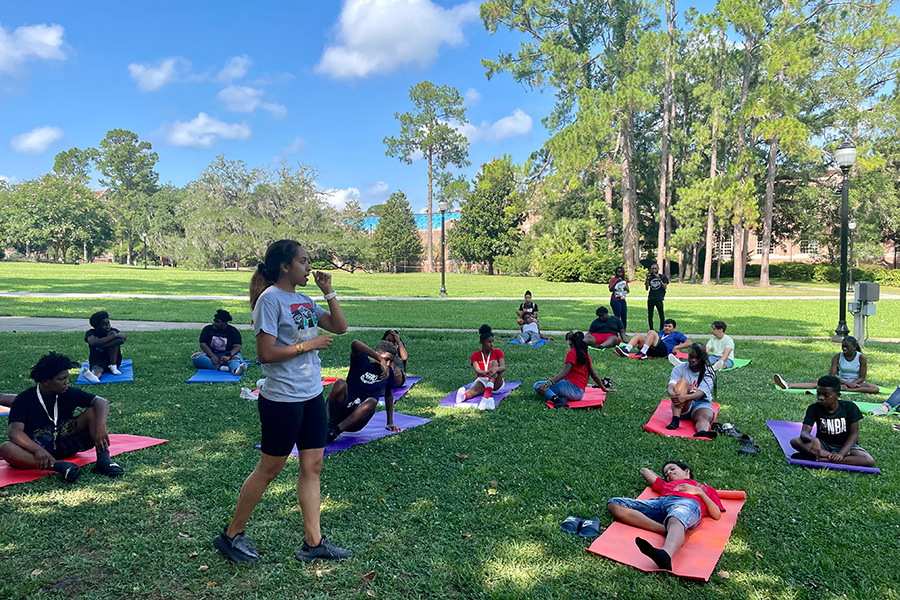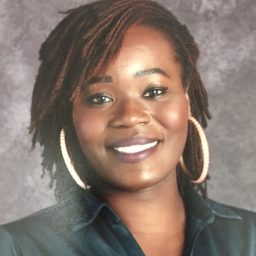
About 60 middle school and high school students from Bay, Holmes and Leon counties are getting a taste of life, summer-camp style, at Florida State University. They’re visiting classrooms, talking with FSU students and hearing from law enforcement and health officials about careers in public service.
They’re even practicing yoga.
The University Summer Experience, a pre-collegiate program of FSU Panama City, began over the weekend with an aim to give traditionally underrepresented sixth- through 12th-graders exposure to college and careers.
The event is taking place on the main FSU campus in Tallahassee. And for some students, it marks the first time traveling outside their hometowns.

“And others are super-excited, too,” said Sheila Labissiere, talent-search program director at Florida State University Panama City. “They’re like, ‘This is the capital!’”
The program lasts one week for middle school students and two weeks for high school students.
All participants would be, like Labissiere, the first in their families to attend college.
“The primary gist of our pre-collegiate program is to push the idea of going to college,” she said. “We want students to go throughout their academic year and even the summer believing that college and access to college is at their fingertips.”
The program previously was administered through FSU’s Center for Academic Retention and Enhancement, or CARE, which offers programs and services that provide equity and access to traditionally underrepresented students.
Labissiere said FSU Panama City is running the University Summer Experience in the spirit of CARE through a partnership with FSU’s main campus. It’s part of FSU Panama City’s efforts, through its state-funded Pre-College Reach-out Program, or CROP, to achieve educational equity for students in Bay, Franklin, Gadsden, Holmes and Leon counties.
“We’re loving the idea of creating opportunities for students,” Labissiere said.
Opportunities include a focus on career fields such as STEM, law enforcement, public service and health sciences.
Students on Tuesday will hear from and meet with representatives of the FSU Police Department and Leon County Sheriff’s Office and their K-9 colleagues. On Thursday, they’ll get a visit from LaDarius Gammage, statewide youth advocacy coordinator for the Florida Department of Health’s Bureau of Tobacco Free Florida.
Those officials will share, among other things, details about their careers and how they got started in them.
Activities also include yoga on Landis Green, a popular place for rest and recreation in the heart of FSU’s campus; a visit to the Challenger Learning Center, an outreach facility of the FAMU-FSU College of Engineering; and two days of canoeing, rock climbing and other activities at FSU’s Rez Lakefront Park.
As high school students heard from members of the FSU Student Government Association on Monday, middle school students engaged in mindfulness and exercise on a shady patch of Landis Green.
“Cross your legs, close your eyes and think about something that makes you feel very good,” instructor Sandra Alber said to about two dozen students.
Alber, who teaches second-grade math and science at Oak Ridge Elementary School in Tallahassee, asked the students what they thought about.
One said a certain place. One said a certain person. Another said a certain song.
“I’m trying to introduce them to the fitness part so that they can be mindful of their bodies,” Alber said. “As for yoga, those are strategies that they can take with them when they start college or when they get back to school. It can help them to decompress from the stresses that they might face while they’re studying or having any type of problem outside of academics.”
Students also will get a firsthand look at other college campuses. On Friday, they’ll visit the FSU Panama City campus and nearby Gulf Coast State College, whose CROP-program students also are participating in the program at FSU.
Next week, high school students will visit Florida A&M University in Tallahassee; the University of North Florida and Edward Waters University in Jacksonville; the University of Central Florida in Orlando; and the University of South Florida in Tampa.
“We want these babies to leave us after these two weeks saying, ‘This is it — college is the direction for me,’” Labissiere said. “Or we want them to say, ‘This is the career that I want to go into.’”




